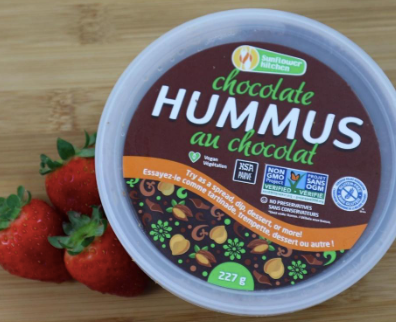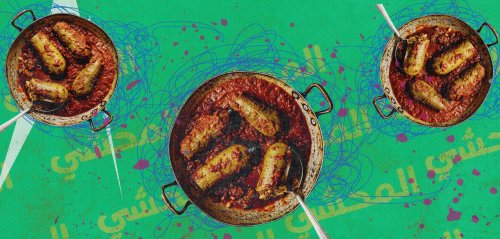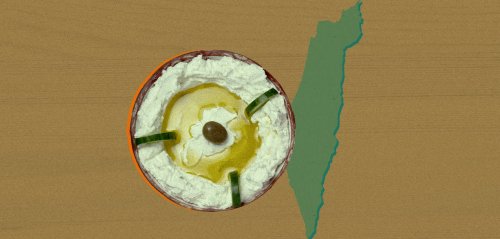In a scene from the comedy series "Mo", produced by Netflix, Mohammad, or Mo, a Palestinian refugee in the United States, becomes infuriated when he encounters a vendor offering samples of a new product: chocolate hummus. He feels insulted, believing it to be a disrespect to his heritage and culture. He takes out a bottle of olive oil he always carries with him and asks the vendor to taste it with bread alone to experience the authentic flavor of Palestinian cuisine.
I found myself feeling the same way while strolling through Toronto. The Canadian – and Western culture in general – astounds me with its obsession for blending diverse foods and creating hybrid dishes that fuse elements from completely different culinary backgrounds.
I was surprised to learn that chocolate hummus isn't actually a joke. Western palates genuinely savor this combination, which may seem peculiar to those hailing from the land of fatteh, hummus, and freshly baked pita bread.
I was surprised to learn that chocolate hummus isn't actually a joke. Western palates genuinely savor this combination, which may seem peculiar to those hailing from the land of fatteh, hummus, freshly baked pita bread, and Buz El Jedi*.
This blending approach conjures an image in my mind of Western taste as an octopus, its arms extending haphazardly to snatch fruits, meats, spices, and herbs from diverse corners of the culinary world, mixing them together at its whim.
The octopus's arms mashes everything together: baking Akkawi cheese pies with avocado, garnishing pizza with falafel and shawarma, and mixing hummus (or "musabbaha" in the Damascene dialect) with chocolate, avocado, pesto, or jalapeños.
 Food Fusion Hummus Chocolate
Food Fusion Hummus Chocolate
In Toronto, there's a restaurant named "Rasta Pasta", which mixes Jamaican and Italian cuisine. Another restaurant serves sushi burritos and sushi pizza, while some places offer sushi with items ad ingredients from the Mexican kitchen.
Once, a friend of mine invited me to eat sushi at a Japanese restaurant he likes, largely because it presented sushi in a modern way that does not adhere to the conventional methods.
As he munched on a piece of sushi fried in oil to a gold crisp reminiscent of KFC food, and saw my expression of mild disgust, he asked, "What's the problem? It's food after all. Why should we stick to a specific recipe? Who decided that sushi must only be served raw?"
I responded in astonishment, "The Japanese themselves? For hundreds of years?" He chuckles at my disbelief and replies that the Japanese themselves, whether in Canada, Germany, or Japan, serve fried sushi.
Whether through the Western approach of blending things together or in a purely Japanese manner, Japanese cuisine is continuously evolving.
I imagine 'Western taste' as an octopus, its arms extending haphazardly to snatch fruits, meats and herbs from diverse corners of the culinary world, just to mash everything together: pizza with falafel or shawarma, and hummus with chocolate, avocado or pesto
Food as cultural memory
Food forms a part of our societal and cultural memory, storing social changes and temporal events symbolically.
Many vegetarian dishes, for instance, emerged during famines, droughts, or environmental disasters. And in turn, these dishes reflect ingredient preferences, natural flavors endemic to specific environments, and weather and seasonal variations.
Food also tells us a lot about religious and social values, and important events, occasions, and traditions.
It naturally mirrors contemporary life and its accompanying social changes.
What's the problem with accepting that food is evolving and our tastes evolve with it? Shouldn't we at least be grateful that we don't have to eat green, yellow, and blue pills as our food, like it had once been envisioned in old science fiction stories?
There's no issue with this natural evolution, as it naturally reflects the progression and evolution of society itself.
This is evident in the Japanese taste for more selectivity and obsession with perfection. Many of the world's best and most expensive foods hail from Japan, such as Wagyu and Kobe beef, the $200-per-piece Yubari King melon, and colossal tuna fish sold at daily auctions for exorbitant prices. The most expensive tuna fish ever sold reached a staggering $3.1 million in 2019.
The exorbitant prices attached to these ingredients can be attributed to the discerning Japanese palate. For instance, Wagyu cattle have a specific level of fat and possess a particular quality and flavor obtained from consuming specific herbs in specific regions with unique soil in Japan. As for the extravagant cost of large tuna fish, it can be traced back to the Japanese preference for the taste of fatty tuna, referred to as "otoro", which can only be found in tuna exceeding a certain weight. In this context, it is the perpetual refinement of taste and the relentless selectivity and pursuit of culinary excellence that ultimately enhances the quality of the final dish, thus reflecting cultural evolution.
The Japanese have been preparing sushi for hundreds of years and never thought to fry it in oil or prepare it in the form of a pizza until they introduced it to the Western public.
Of course, this is further enhanced by the features of wealth and economic prosperity that Japan enjoys, which are in turn reflected in its food.
On the other hand, the concept of 'omakase', a style of presenting luxurious sushi, where upscale Japanese restaurants compete to offer the finest ingredients and freshest fish, traces its origins to street-side eateries and markets. There, fishermen and market workers would enjoy their lunch from the day's catch.
The Japanese may be frying sushi themselves, and Arabs may be promoting chocolate hummus themselves, but the ingredient foreign to the culture is evident in both cases, whether it's the purely Western approach of deep frying or the chocolate that Europe adores.
In both cases, the driving force is the desire to cater to Western tastes, rather than a natural evolution of the cuisine.
The Japanese have been preparing sushi for hundreds of years and never thought to fry it in oil or prepare it in the form of a pizza until they introduced it to the Western public.
Shawarma is an excellent example. It is referred to and prepared differently in each country. In Syria, chicken shawarma is typically served with garlic sauce and pickles.
Turks, on the other hand, prefer to only add tomato sauce or hot sauce on their 'doner' sandwiches, along with plenty of vegetables, cabbage or lettuce. In Greece, they add tomatoes, cucumbers, garlic, onions, and tzatziki sauce made from yogurt.
To prepare makdous sushi, chocolate hummus, or lobster molokhiya and call this an 'evolution of Syrian cuisine' is highly questionable to me
Tastes have evolved differently in each region to allign with local culture, ingredients, and preferences. In contrast, shawarma is treated as an additional component over here, on the other side of the world; it's used to garnish Canadian poutine (french fries with meat sauce and cheese), or stuffed into Mexican burritos, or even used as pizza toppings!
Collins Dictionary defines 'food fusion' as a cooking style that combines traditional Western techniques with ingredients used in Eastern cuisine, while Oxford Dictionary refers to it as the blending of European and "Eastern" ingredients.
Hence, this is undoubtedly a purely Western concept, separate from the natural fusion of foods stemming from the contact of cultures with each other. Spices, such as Indian spices, for instance, are scattered along the Silk Road, mixing with roasted bananas, beans, and corn to create Creole cuisine, a hybrid offspring of the intermingling of Indian and Caribbean cultures, or Cajun cuisine. Even fusion has its proper "origins", so to speak.
Therefore, to prepare makdous sushi, chocolate hummus, or lobster molokhiya and call this an 'evolution of Syrian cuisine' is something I would doubt very much.
*Buz El Jedi is one of the most famous Damascene restaurants serving traditional dishes like fatteh, foul, hummus, and falafel.
Raseef22 is a not for profit entity. Our focus is on quality journalism. Every contribution to the NasRaseef membership goes directly towards journalism production. We stand independent, not accepting corporate sponsorships, sponsored content or political funding.
Support our mission to keep Raseef22 available to all readers by clicking here!
Interested in writing with us? Check our pitch process here!







